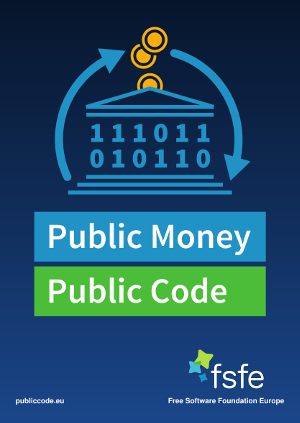Vincent Lequertier
This page is part of a series of interviews with FSFE supporters and friends to help give a face to our community. Get an overview about our interviews on the testimonialspage
"I'm Vincent Lequertier, I'm 23 years old and I'm passionate about computer science, artificial intelligence and cryptography. I love learning new things, reading, traveling and listening to music."
"The FSFE and me in 30 seconds"
Video by David Vagt. No animals have been harmed and the following Free Software has been used: kdenlive, blender, LMMS, Audacity and ffmpeg.
Short Interview with Vincent Lequertier (2019)
FSFE: What made you interested in the FSFE and motivated to support it?
Vincent Lequertier: My first experience with Free Software was with Cacti, a monitoring software I used to get health reports and bandwidth usage from network switches. I remember how excited I was when I discovered that I can easily modify the source code of the software, fix bugs, add features and customize it to fit my needs. Then I got involved in the Mozilla community and started to contribute to the Firefox web browser. I discovered FSFE last year when I was looking for an internship in a NGO that supported Free Software. I already knew FSFE existed at that time, but I did not contribute to it. So I applied to the internship program of FSFE. You can do that too, it's great.
Beyond supporting the FSFE, you also engage as a volunteer. What are you doing for FSFE?
I am a part of the System Hackers team. The team is responsible for the technical infrastructure of the FSFE. That includes, for example, mailing lists, Git server or savecodeshare.eu website. I work mostly on the services deployed on lund.fsfeurope.org, both on the software that hosts them and the services themselves, where I make sure everything is running smoothly, relevant to the FSFE's mission and the users' needs. I also contribute to the 'Public Money? Public Code!' campaign in various ways.
What is the most fun part about engaging for FSFE?
The best part for me is being able to look around and see how everything works. As a member of System Hackers team, nothing is hidden away from your sight. Everything is built in the open way (while still being secure of course!), you can go through all the code, help each other. That makes contributing fun to me.
What is your favourite FSFE campaign at the moment?
My favorite campaign is "Public Money? Public Code!". The campaign raises issues I had never asked myself before, but makes perfect sense to me now. When I discovered the campaign, I was wondering why we need to do it, why in public administrations software isn't built in an open way that allows to work together. In Europe, by design, a lot of countries have similar regulations and needs, so why should they reinvent the wheel so many times? On the other hand, by using Free Software people would be able to trust public administrations more, for example by knowing exactly how their children will be affected in schools, or how the amount of tax they have to pay will be calculated. So I like this campaign a lot because, in my opinion, it is helpful for everybody and is truly making a difference.

Does it make a difference if Artificial Intelligence is based on Free Software?
Yes, absolutely! I will even go as far as saying that Artificial Intelligence based on non-free software is not usable. AI is not a solved problem. Far from it. You must use Free Software to inspect what the AI-based software does. Understanding how Artificial Intelligence is working is hard enough already, so we need to have all the source code and help available to grasp it. This is why all popular Deep Learning (a subpart of Artificial Intelligence) libraries are Free Software. For example Tensorflow, Keras, Pytorch, etc. All the others benefits of Free Software also make a difference for AI: the ability to share the source code stimulates innovation, ensures the software can be made secure and prevent it from being locked-down.
You can read more about Free software and Deep Learning in my recent blog post.
In one sentence: What is the biggest benefit of Free Software?
The biggest benefit of Free Software is trust, because you know you're in control of technology when you can understand it, improve it and share it with everyone.
What is your favourite Free Software?
My favorite Free Software is Firefox It's a web browser developed by the Mozilla foundation and its community. I like it because it allows you to browse the web in a way that respects your privacy, and it's fast and secure. Being Free Software, everyone can use it, improve it and request new features. In my opinion it's a great example of why Free Software is successful: the development model makes the control of the software by a single actor impossible and guarantees that software serves the user, not the interests of private companies. Firefox has been around for 15 years and I'm sure this is largely due to its licensing.
Is there anything you believe the FSFE should improve or begin working on next? Any wishes for the future?
I think the FSFE should make it easier for people to contribute to the technical infrastructure. Currently, volunteers have to go through some complex steps to get involved, and I'm quite sure we are losing potential contributors because of that. But I also think we're going to the right direction with regard to this issue. I hope the general trend toward Free Software in legislation continues.

